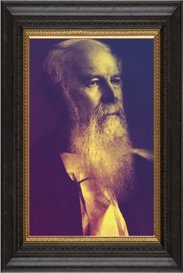 J.C. Ryle
J.C. Ryle by J.C. Ryle
(1816-1900)
"Sin is the transgression of the law"
(1 John 3:4)
He who wishes to attain right views about Christian holiness — must begin by examining the vast and solemn subject of sin. He must dig down very low — if he would build high. A mistake here is most mischievous. Wrong views about holiness — are generally traceable to wrong views about human corruption. I make no apology for making some plain statements about sin.
The plain truth is, that a right understanding of SIN lies at the root of all saving Christianity. Without it, such doctrines as justification, conversion, sanctification, are "words and names" which convey no meaning to the mind. The first thing, therefore, that God does when He makes anyone a new creature in Christ, is to send light into his heart and show him that he is a guilty sinner! The material creation in Genesis began with "light," and so also does the spiritual creation. God "shines into our hearts" by the work of the Holy Spirit — and then spiritual life begins (2 Corinthians 4:6).
Dim or indistinct views of sin are the origin of most of the errors, heresies and false doctrines of the present day. If a man does not realize the dangerous nature of his soul's disease — you cannot wonder if he is content with false or imperfect remedies. I believe that one of the chief needs of the contemporary church has been, and is — clearer, fuller teaching about sin.
We are all, of course, familiar with the terms "sin" and "sinners." We talk frequently of "sin" being in the world, and of men committing "sins." But what do we mean by these terms and phrases? Do we really know? I fear there is much mental confusion and haziness on this point. Let me try, as briefly as possible, to supply an answer.
"Sin," speaking generally, is, as the Ninth Article of our church declares, "the fault and corruption of the nature of every man that is naturally engendered of the offspring of Adam; whereby man is very far gone from original righteousness, and is of his own nature inclined to evil, so that the flesh lusts always against the spirit; and, therefore, in every person born into the world, it deserves God's wrath and damnation."
Sin is that vast moral disease which affects the whole human race, of every rank and class and name and nation and people and tongue-a disease from which there never was but one born of woman that was free. Need I say, that One was Christ Jesus the Lord?
I say, furthermore, that "a sin," to speak more particularly, consists in doing, saying, thinking or imagining anything that is not in perfect conformity with the mind and law of God. "Sin," in short, as the Scripture says, is "the transgression of the law" (1 John 3:4). The slightest outward or inward departure from absolute mathematical parallelism with God's revealed will and character, constitutes a sin, and at once makes us guilty in God's sight.
Of course, I need not tell anyone who reads his Bible with attention, that a man may break God's law in heart and thought — when there is no overt and visible act of wickedness. Our Lord has settled that point beyond dispute in the sermon on the mount (Matthew 5:21-28). Even a poet of our own has truly said, "A man may smile and smile — and be a villain."
Again, I need not tell a careful student of the New Testament, that there are sins of omission as well as commission; and that we sin, as our Prayer Book justly reminds us, by "leaving undone the things we ought to do," as really as by "doing the things we ought not to do." The solemn words of our Master in the Gospel of Matthew, place this point also beyond dispute. It is there written: "Depart from Me, you who are cursed, into everlasting fire . . . for I was an hungry — and you gave Me nothing to eat; I was thirsty — and you gave Me nothing to drink" (Matthew 25:41, 42).
I do think it necessary in these times, to remind my readers that a man may commit sin and yet be ignorant of it, and imagine himself innocent — when he is guilty. I fail to see any Scriptural warrant for the modern assertion that: "Sin is not sin to us — until we discern it and are conscious of it." On the contrary, in the fourth and fifth chapters of that unduly neglected book, Leviticus, and in the fifteenth of Numbers, I find Israel distinctly taught that there were sins of ignorance which rendered people unclean, and needed atonement (Lev. 4:1-35; 5:14-19; Num. 15:25-29). And I find our Lord expressly teaching that "the servant who knew not his master's will and did it not," was not excused on account of his ignorance, but was "beaten" or punished (Luke 12:48). We will do well to remember that, when we make our own miserably imperfect knowledge and consciousness, the measure of our sinfulness — we are on very dangerous ground. A deeper study of Leviticus might do us much good.
Excerpted and adapted from “Holiness” by J.C. Ryle, the chapter titled “Sin.”
http://www.gracegems.org/Ryle/holiness.htm

 RSS Feed
RSS Feed
